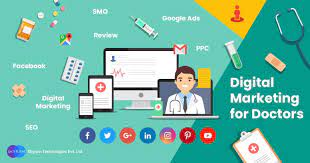Digital Marketing for Doctors: Enhancing Patient Engagement and Practice Growth
In today’s digital age, it has become increasingly important for doctors to embrace the power of digital marketing to connect with patients, build their online presence, and grow their medical practices. With the majority of patients turning to the internet for healthcare information and recommendations, a strong digital marketing strategy can make a significant difference in attracting new patients and fostering long-term relationships.
Building a Professional Website:
A well-designed and user-friendly website is the foundation of any successful digital marketing campaign for doctors. It serves as a virtual front door to your practice, providing information about your services, expertise, and contact details. Ensure that your website is mobile-responsive, as more patients are accessing healthcare information via smartphones and tablets.
Search Engine Optimization (SEO):
Optimizing your website’s content with relevant keywords and meta tags can improve its visibility on search engine results pages. This helps potential patients find you when they search for specific medical services or conditions in your area. Collaborating with an SEO specialist can ensure that your website ranks higher in search engine rankings, driving organic traffic to your practice.
Content Marketing:
Creating informative and engaging content is an effective way to establish yourself as an authority in your field while educating patients about various health topics. Consider starting a blog or publishing articles on your website that address common patient concerns or provide insights into specific medical conditions or treatments. Sharing this content on social media platforms can help reach a wider audience.
Social Media Presence:
Maintaining an active presence on social media platforms such as Facebook, Twitter, Instagram, or LinkedIn allows you to connect with patients on a more personal level. Share valuable health tips, success stories, community involvement activities, and updates about your practice to engage with current patients and attract new ones.
Online Reputation Management:
Online reviews play a crucial role in shaping potential patients’ perception of your practice. Encourage satisfied patients to leave positive reviews on platforms like Google My Business, Healthgrades, or RateMDs. Responding promptly and professionally to both positive and negative feedback demonstrates your commitment to patient satisfaction and care.
Paid Advertising:
Digital advertising platforms like Google Ads or social media ads can help you target specific demographics or geographic locations, ensuring that your practice reaches the right audience. Consider investing in paid search ads or display ads to increase visibility and drive traffic to your website.
Telemedicine and Online Appointment Booking:
The COVID-19 pandemic has accelerated the adoption of telemedicine services. Integrating telemedicine options into your practice allows you to provide convenient remote consultations for patients who prefer virtual visits. Additionally, offering online appointment booking simplifies the scheduling process for both new and existing patients.
In conclusion, digital marketing has become an essential tool for doctors to thrive in today’s competitive healthcare landscape. By leveraging various digital marketing strategies such as building a professional website, optimizing online content, engaging with patients through social media, managing online reputation, utilizing paid advertising, and embracing telemedicine options, doctors can enhance patient engagement, expand their reach, and ultimately grow their medical practices. Embracing digital marketing is not only a necessity but also an opportunity for doctors to connect with patients in meaningful ways while staying ahead in the ever-evolving healthcare industry.
Frequently Asked Questions: Digital Marketing Strategies for Doctors
- How to do marketing to doctors?
- How to do digital marketing for medicine?
- How digital marketing is useful for doctors?
- How to market medical practice on social media?
How to do marketing to doctors?
Marketing to doctors requires a strategic approach that takes into consideration their unique needs and preferences. Here are some effective strategies to consider when marketing to doctors:
- Identify your target audience: Understand the specific segment of doctors you want to reach, such as general practitioners, specialists, or those in a specific medical field. Tailor your marketing efforts accordingly.
- Develop a strong online presence: Create a professional website that highlights your services, expertise, and patient testimonials. Optimize your website for search engines so that doctors can easily find you when searching for relevant keywords.
- Content marketing: Produce high-quality content that educates and informs doctors about industry trends, new research, and best practices. This could include blog posts, whitepapers, case studies, or videos. Share this content through your website and social media channels.
- Utilize social media: Doctors are increasingly active on social media platforms like LinkedIn and Twitter. Engage with them by sharing valuable content, participating in relevant discussions, and networking with other healthcare professionals.
- Attend medical conferences and events: Participate in industry conferences and events where doctors gather to exchange knowledge and network. Set up a booth or give presentations to showcase your services and establish connections with physicians.
- Build relationships with referral sources: Establish strong relationships with other healthcare providers who may refer patients to you. This could include primary care physicians or specialists in related fields.
- Online reputation management: Monitor online reviews on platforms like Google My Business or healthcare-specific review sites. Encourage satisfied patients to leave positive reviews and promptly address any negative feedback.
- Offer educational webinars or workshops: Host online webinars or workshops focused on topics relevant to doctors’ professional development or advancements in their field of expertise.
- Collaborate with medical associations or societies: Partnering with reputable medical associations or societies can help increase your credibility among doctors by demonstrating your commitment to the profession.
- Provide exceptional patient care: Word-of-mouth recommendations from satisfied patients can be a powerful marketing tool. Focus on delivering excellent patient experiences and outcomes to encourage positive referrals.
Remember, building trust and credibility with doctors takes time and consistent effort. By implementing these strategies, you can effectively market your services to doctors and establish long-lasting relationships within the medical community.
How to do digital marketing for medicine?
Digital marketing for medicine requires a strategic approach to reach and engage with patients, build trust, and promote healthcare services effectively. Here are some key steps to help you get started:
- Define Your Target Audience: Identify the specific patient demographics you want to target. Consider factors such as age, gender, location, medical conditions, and healthcare needs. Understanding your audience will help tailor your digital marketing efforts accordingly.
- Build a Professional Website: Create a well-designed website that showcases your medical practice or healthcare institution. Ensure it is user-friendly, mobile-responsive, and provides essential information about your services, doctors’ profiles, contact details, and appointment booking options.
- Search Engine Optimization (SEO): Optimize your website content with relevant keywords related to medical specialties and services you offer. This will help your website rank higher in search engine results when patients search for specific medical information or services in your area.
- Content Marketing: Develop informative and engaging content that educates patients about health topics, preventive care tips, treatment options, or new medical advancements. Publish blog posts/articles on your website regularly to establish yourself as a trusted source of medical information.
- Social Media Presence: Create professional profiles on popular social media platforms such as Facebook, Twitter, Instagram, or LinkedIn. Share valuable health tips and updates about your practice regularly to engage with patients and build an online community.
- Online Reputation Management: Monitor online reviews and respond promptly to patient feedback on platforms like Google My Business or healthcare-specific review sites (e.g., Healthgrades). Encourage satisfied patients to leave positive reviews to enhance your online reputation.
- Paid Advertising: Consider investing in paid advertising campaigns on search engines (Google Ads) or social media platforms (Facebook Ads). Target specific demographics or geographic locations to reach potential patients effectively.
- Email Marketing: Build an email list of interested patients through newsletter sign-ups on your website or during appointments. Send regular newsletters or updates to share relevant health information, promote services, or announce upcoming events.
- Telemedicine and Online Appointment Booking: Embrace telemedicine options to provide remote consultations for patients who prefer virtual visits. Offer online appointment booking systems to simplify the scheduling process and improve patient convenience.
- Analytics and Tracking: Utilize web analytics tools (e.g., Google Analytics) to track website traffic, user behavior, and campaign performance. Analyze data regularly to identify areas for improvement and make data-driven decisions for future marketing efforts.
Remember, digital marketing for medicine requires compliance with healthcare regulations (e.g., HIPAA) and patient privacy considerations. Ensure that you adhere to these guidelines when implementing your digital marketing strategies.
By adopting these digital marketing techniques, you can effectively promote your medical services, engage with patients, and establish a strong online presence in the healthcare industry.
How digital marketing is useful for doctors?
Digital marketing offers numerous benefits for doctors, enabling them to enhance their online presence, engage with patients, and grow their medical practices. Here are some key ways digital marketing is useful for doctors:
- Increased Online Visibility: A strong digital marketing strategy helps doctors improve their visibility on search engines, making it easier for potential patients to find them when searching for specific medical services or conditions. This increased visibility can lead to a higher number of website visitors and inquiries.
- Targeted Patient Reach: Digital marketing allows doctors to target specific demographics or geographic locations with their messaging. This ensures that their marketing efforts are reaching the right audience, increasing the chances of attracting patients who are more likely to benefit from their services.
- Patient Education and Engagement: Through content marketing strategies such as blogging or social media posts, doctors can provide valuable health information and education to patients. This helps establish trust and positions the doctor as an authority in their field. Engaging with patients through comments, messages, or live sessions fosters a sense of connection and encourages patient loyalty.
- Online Reputation Management: Online reviews play a crucial role in shaping patients’ perceptions of doctors. Digital marketing allows doctors to actively manage their online reputation by encouraging satisfied patients to leave positive reviews and promptly addressing any negative feedback. A positive online reputation builds trust among potential patients and can significantly impact the success of a medical practice.
- Cost-Effective Advertising: Traditional forms of advertising can be expensive for doctors, especially those starting or running small practices. Digital marketing provides cost-effective alternatives such as pay-per-click (PPC) advertising or social media ads that allow doctors to reach a targeted audience within a specific budget.
- Telemedicine Adoption: The COVID-19 pandemic has accelerated the adoption of telemedicine services worldwide. Digital marketing helps doctors promote their telemedicine offerings, making it convenient for patients to access healthcare remotely. This expands the reach of a doctor’s practice beyond physical location, attracting patients from a wider geographic area.
- Appointment Booking and Patient Convenience: Digital marketing enables doctors to offer online appointment booking systems, simplifying the scheduling process for both new and existing patients. This convenience enhances patient satisfaction and encourages them to choose a doctor who embraces technology to improve the overall patient experience.
In summary, digital marketing offers doctors a range of benefits, including increased online visibility, targeted patient reach, patient education and engagement, online reputation management, cost-effective advertising options, telemedicine adoption, and improved patient convenience. By leveraging digital marketing strategies effectively, doctors can enhance their practice’s growth and establish themselves as trusted healthcare providers in the digital age.
How to market medical practice on social media?
Marketing a medical practice on social media can be an effective way to connect with patients, build brand awareness, and establish yourself as a trusted healthcare provider. Here are some strategies to market your medical practice on social media:
- Choose the Right Social Media Platforms: Determine which social media platforms are most relevant to your target audience. Facebook is a popular choice for healthcare professionals due to its wide user base and diverse demographics. Instagram can be effective for visually-oriented content, while LinkedIn is ideal for professional networking.
- Develop a Content Strategy: Plan and create engaging content that educates, informs, and entertains your audience. Share health tips, answer frequently asked questions, debunk common myths, or provide insights into medical conditions or treatments. Use a mix of text, images, videos, and infographics to keep your content varied and appealing.
- Engage with Your Audience: Social media is all about building relationships. Respond promptly to comments, messages, and inquiries from your followers. Encourage dialogue by asking questions or conducting polls related to healthcare topics. Show empathy and provide helpful information whenever possible.
- Highlight Patient Success Stories: With patient consent, share success stories or testimonials that showcase the positive impact of your medical practice. This helps build trust and credibility among potential patients.
- Utilize Visuals: Visual content tends to grab attention on social media platforms. Share images of your office space, staff members, or behind-the-scenes glimpses of daily activities at your practice. Infographics can effectively convey complex medical information in an easy-to-understand format.
- Collaborate with Influencers: Identify influencers in the healthcare industry who align with your practice’s values and target audience. Collaborating with them through sponsored posts or partnerships can help increase your reach and credibility.
- Advertise Strategically: Consider running targeted ads on social media platforms to reach specific demographics or geographic locations that align with your patient base.
- Stay Compliant with Patient Privacy: Adhere to patient privacy regulations such as HIPAA (Health Insurance Portability and Accountability Act) when sharing patient-related content or responding to inquiries on social media.
- Educate and Inform: Use your social media presence to educate patients about preventive care, health screenings, and the importance of regular check-ups. Provide valuable information that empowers patients to take control of their health.
- Monitor and Analyze Results: Regularly review your social media analytics to understand what content resonates with your audience, which platforms drive the most engagement, and how your efforts are contributing to practice growth. Adjust your strategy accordingly.
Remember, building a strong social media presence takes time and consistent effort. Be patient, authentic, and focused on providing value to your audience. By leveraging the power of social media marketing, you can effectively promote your medical practice while fostering meaningful connections with current and potential patients.




